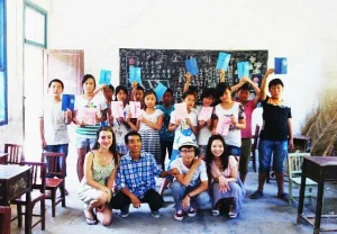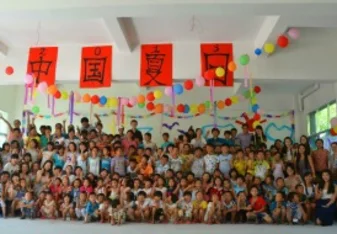Yeon Ji is from Seoul, South Korea, and currently attends Duke University. She loves travelling and making new acquaintances, and adores languages though she is an engineering major
Why did you decide to volunteer abroad with United Planet in China?
In my school, there is a program called Jenkins Fellowship program that funds a few students every year to participate in abroad service projects. I initially intended to join a Habitat for Humanity trip in Sri Lanka, but their legal council decided that I was too young. Thus, I was looking for another project and this captured my mind.
For one, I love to teach and I’ve learned Chinese in the past two summers. Furthermore, China is very close to Korea, where I stay during summer break.
United Planet seemed to be a reliable organization (and they are) and the volunteers were all around my age. Most importantly, I was searching for something meaningful to do this summer, and the project had an actual impact on the community.
Describe your day to day activities as a volunteer.
We wake up around 7AM to do morning chores if we’re on duty. Breakfast is at 8 and class starts at 9. There are five 45-minute classes per day with a two-hour break between 12:30~2:30.
There are three classes before lunch / break and two afterwards. The school ends at 4:10PM and volunteers can rest until dinner at 5:30. After dinner, we gather to plan tomorrow’s lessons and participate in group activities such as bonding games, planning Earth day and preparing for graduation towards the end of the trip.
Lights out is at 10:30PM. On rest days, volunteers visit student’s homes, walk to the local market, take a hike in the mountains and make dumplings.
Two main events that we plan and prepare are Earth day and graduation. At the beginning and the end of the trip, volunteers go sight-seeing in cities such as Beijing and Huaihua.
If you could go back and do something different, what would it be?
I would’ve brought vitamins and iron pills because the heat (over 105F everyday) made me lose appetite and I didn’t eat much food. The food itself is Chinese-style, normally pork, eggs with tomatoes, rice and potatoes or some kind of vegetables.
I have no complaints about the food but because I didn’t eat much, my immune system faltered and I suffered from a cold and heat strokes simultaneously, which greatly shrank the number of classes that I could teach.
Most volunteers were perfectly healthy, especially those that drank Chinese tea or ate vitamins. Also, I should’ve brought a mosquito repellent – the area is malaria-safe, but mosquitoes really loved my blood.
Otherwise, I have minimal regrets. I formed strong bonds with both foreign and Chinese volunteers, learned the volunteers’ different cultures, improved my Chinese, taught and observed most classes and had a tremendous amount of fun.
What was the best moment of your experience?
Chinese and American volunteers bonded strongly through the Chinese version of mafia. Unlike the American mafia where there is a god who picks a killer and a guard, the Chinese version involves cards and is much more complex.
At first we struggled to learn the different roles and each round took forever because everyone makes an accusation / defense before voting on the killer, but it quickly became a communal activity among volunteers.
We even played with the headmaster, who didn’t speak any English. Another favorite activity was watching the stars on the basketball court. As the elementary school was located in a very rural area, I saw more stars than I’d ever seen in my life (and I’ve visited astronomy observatories!).
I’ve seen my first shooting stars there, same as many other volunteers. Many foreign volunteers brought our blankets down to the basketball court, played slow music and gazed at the stars. Those nights will be treasured memories throughout my life.
How has this experience impacted your future?
Though it may sound cliché, it truly broadened my horizons. I learned more about Chinese culture than I ever could from second-hand resources (books, videos, etc.), and I also learned about Scottish and English cultures.
By living in a rural elementary school, I became humbled and grateful for what I have, instead of complaining about what I don’t have. Furthermore, my teaching partners had great teaching assets.
They were patient and loving, and I learned much from observing them and hope to become like them. Professionally, I had always aspired to become a professor. This strengthened my goal, as teaching did prove to be my passion.

